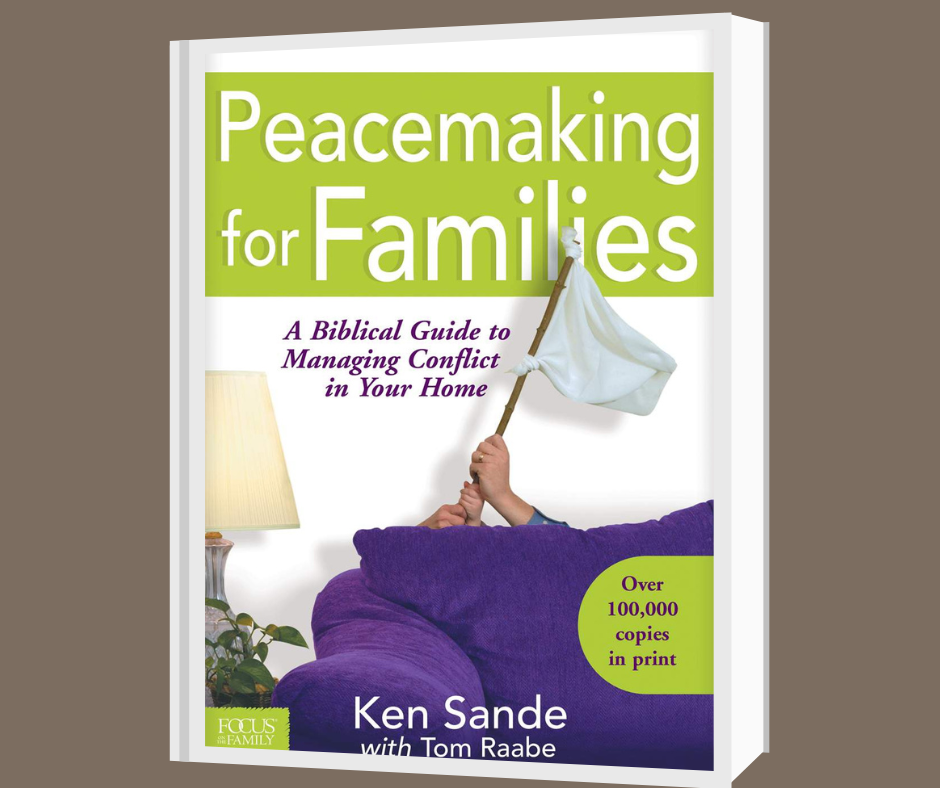Book Reviews
Peacemaking for Families by Ken Sande with Tom Raabe | Review by Rosa Byler

Ken Sande, a Christian attorney and conference speaker, has spent nearly thirty years studying and practicing the application of Biblical principles to conflict situations. His experiences cover a wider variety of types of conflict than many pastors will encounter in a lifetime, from legal and workplace situations (conflict with unbelievers) to church and family (conflict with fellow Christians and those we love the most.) Peacemaking for Families is the family-specific version of Ken Sande’s more well-known The Peacemaker: A Biblical Guide to Resolving Conflicts.
Most of us shrink from conflict. As Christians, we have the uncomfortable feeling that it ought not to happen, and certainly not in our families! Sande makes it clear that studying the Scriptures will show us at least three truths: conflict is inevitable; God’s grace offers incredible hope in conflict; and conflict provides opportunities to grow in Christ-like character, serve others, and reflect the glory of God.
We are called to be peacemakers—but instead of embracing that responsibility with enthusiasm, many of us demonstrate a pattern of responding in one of two sinful ways. “Peace-fakers” are focused on self and choose escapist strategies, varying from denial and avoidance to suicide in extreme cases. “Peace-breakers” see conflict as a chance to claim their rights and be in control; they blame the other person and expect him to solve the problem. They generally attack instead of trying to flee. This can include verbal and physical violence, escalating to legal battles and even murder (and Sande reminds us that harboring anger and hatred towards someone makes us guilty of murder.) If the conflict goes on long enough, as in a marriage, many people switch back and forth between attack and flight responses.
At the heart of conflict is idolatry: loving, fearing, or trusting anything other than God alone. Sande defines an idol as ”any desire that has grown into a consuming demand that rules our heart…something we think we must have to be happy, fulfilled, or secure.” After a brief presentation of the Gospel, he gives a Biblical framework for peacemaking in the “Four G’s”: glorify God, get the log out of your own eye, go and show your brother his fault, and go and be reconciled. In Part Two of the book (“The Peacemaking Marriage”), these principles are applied specifically to conflict in marriage as confession, confrontation, forgiveness, and negotiation. Wrong and foolish examples of each are given as well as teaching on the right procedure. (Sande does not hesitate to tell stories in which he is the villain!) Forgiveness is especially well-defined, addressing common misconceptions and offering help for those who feel “stuck” in an inability to forgive.
As any parent knows, children are not automatically interested in being peacemakers but are naturally inclined to quarrel with each other. Two chapters cover teaching young children Biblical peacemaking principles and applying those to your own conflicts with your children. You may feel it is too late; Sande offers hope for families with older children where sinful conflict patterns are well-established.
What about conflict between members of a family who are now all adults and on their own? Family dynamics are made more complex with the addition of in-laws and grandchildren. Some families struggle with extra pressures such as mental problems, sexual abuse, or alcohol. The four G’s are shown by example to be applicable even in complicated situations.
The last two chapters return to the theme of peacemaking in marriage. While Sande is quick to say that this is not primarily a marriage manual, marriage is one life situation in which conflict is guaranteed by our sinful natures to happen. Recognizing that marriage is not only a gift to us but also a model to the world of how Christ loves the church, we should take every wise precaution that we can to safeguard our marriages. Churches should be actively involved in helping their members nurture the marriage relationship and stay accountable.
Each chapter closes with an “As You Grow” section of thought-provoking questions or a condensation of the chapter’s principles. Other books and resources are listed for those who are interested in “Digging Deeper,” and the book closes with appendices including a “Peacemaker’s Checklist” and suggestions for further help and teaching materials.
This book certainly obeys the injunctions to “exhort one another” and “provoke one another unto love and good works.” What impressed me most was the way principles directly from Scripture were applied to ordinary situations, emphasizing the hope that we have through the resurrection power of Jesus Christ. Whether you are involved in formal conflict mediation or simply working through the disharmonies of everyday family life, this book will minister hope and encouragement to you.